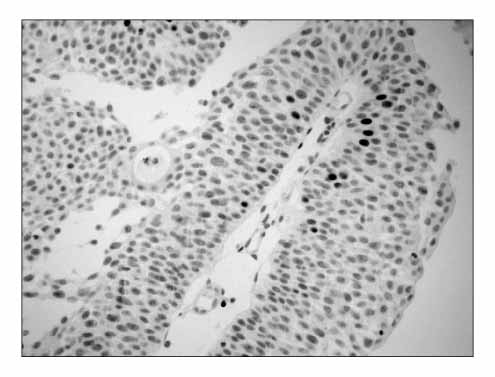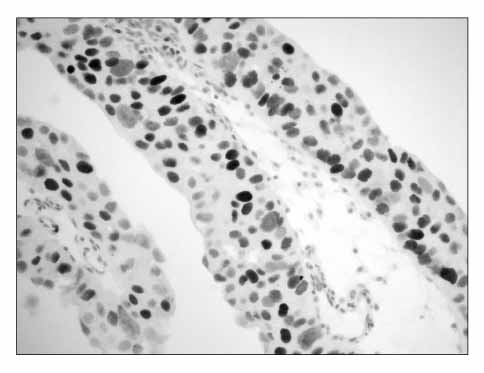Korean J Urol.
2008 Jan;49(1):12-17.
The Expression and Clinical Significance of the Minichromosome Maintenance (MCM) 7 Proliferation Markers in Urothelial Carcinomas of the Bladder
- Affiliations
-
- 1Department of Patholgy, School of Medicine, Cheju University, Jeju, Korea.
- 2Department of Urology, School of Medicine, Cheju University, Jeju, Korea. urohjs@cheju.ac.kr
- 3Department of Forensic Medicine, School of Medicine, Cheju University, Jeju, Korea.
Abstract
-
PURPOSE: The antibodies for minichromosome maintenance(MCM) proteins have been reported as potential proliferative markers and prognostic indicators in various human malignancies. The present study examined the expression pattern of MCM proteins in bladder carcinomas, and we also evaluated their prognostic significance as well as their potential applicability as proliferation markers.
MATERIALS AND METHODS
Immunohistochemistry for MCM7 and Ki-67 was performed on paraffin sections from 47 cases of bladder carcinoma. The MCM7 and Ki-67 expressions were quantified and then analysis was carried out for determining the association between the expressions of MCM7 and Ki-67 and the clinicopathological parameters.
RESULTS
A significant correlation existed between the expression rate of MCM7 and the histological grade(p<0.0001). The Ki-67 expression rate was significantly related to the tumor grade(p=0.002) and the pathological stage(p=0.011). On multivariate analysis, MCM7 was not found to be an independent prognostic factor for predicting the recurrence of bladder carcinoma.
CONCLUSIONS
The results suggest that MCM is a reliable proliferation marker, but not an independent predictive factor for recurrence of bladder carcinoma.
Keyword
MeSH Terms
Figure
Reference
-
1. Lipponen PK, Eskelinen MJ, Nordling S. Progression and survival in transitional cell bladder cancer: a comparison of established prognostic factors. S-phase fraction and DNA ploidy. Eur J Cancer. 1991. 27:877–881.2. Freeman A, Morris LS, Mills AD, Stoeber K, Laskey RA, Williams GH, et al. Minichromosome maintenance proteins as biological markers of dysplasia and malignancy. Clin Cancer Res. 1999. 5:2121–2132.3. Yu Z, Feng D, Liang C. Pairwise interactions of the six human MCM protein subunits. J Mol Biol. 2004. 340:1197–1206.4. Padmanabhan V, Callas P, Philips G, Traniner TD, Beatty BG. DNA replication regulation protein MCM7 as a marker of proliferation in prostate cancer. J Clin Pathol. 2004. 57:1057–1062.5. Tachibana KK, Gonzalez MA, Coleman N. Cell-cycle-dependent regulation of DNA replication and its relevance to cancer pathology. J Pathol. 2005. 205:123–129.6. Ha SA, Shin SM, Namkoong H, Lee H, Cho GW, Hur SY, et al. Cancer-associated expression of minichromosome maintenance 3 gene in several human cancers and its involvement in tumorigenesis. Clin Cancer Res. 2004. 10:8386–8395.7. Sakwe AM, Nguyen T, Athanasopoulos V, Shire K, Frappier L. Identification and characterization of a novel component of the human minichromosome maintenance complex. Mol Cell Biol. 2007. 27:3044–3055.8. Kruger S, Thorns C, Stocker W, Muller-Kunert E, Bohle A, Feller AC. Prognostic value of MCM2 immunoreactivity in stage T1 transitional cell carcinoma of the bladder. Eur Urol. 2003. 43:138–145.9. Korkolopoulou P, Givalos N, Saetta A, Goudopoulou A, Gakiopoulou H, Thymara I, et al. Minichromosome maintenance proteins 2 and 5 expression in muscle-invasive urothelial cancer: a multivariate survival study including proliferation markers and cell cycle regulators. Hum Pathol. 2005. 36:899–907.10. Kuczyk MA, Serth J, Hervatin C, Arndt H, Derendorf L, Thon WF, et al. Detection of p53 tumor-suppressor-gene protein in bladder tumors and prostate cancer: possible clinical implications. World J Urol. 1994. 12:345–351.11. Herr HW. Natural history of superficial bladder tumors: 10-to 20-year follow-up of treated patients. World J Urol. 1997. 15:84–88.12. Pich A, Chiusa L, Formiconi A, Galliano D, Bortolin P, Navone R. Biologic differences between noninvasive papillary urothelial neoplasms of low malignant potential and low-grade (grade1) papillary carcinomas of the bladder. Am J Surg Pathol. 2001. 25:1528–1533.13. Mariappan P, Smith G. A surveillance schedule for G1Ta bladder cancer allowing efficient use of check cystoscopy and safe discharge at 5 years based on a 25-year prospective database. J Urol. 2005. 173:1108–1111.14. Takisawa H, Mimura S, Kubota Y. Eukaryotic DNA replication: from pre-replication complex to initiation complex. Curr Opin Cell Biol. 2000. 12:690–696.15. Musahl C, Holthoff HP, Lesch R, Knippers R. Stability of the replicative Mcm3 protein n proliferating and differentiating human cells. Exp Cell Res. 1998. 241:260–264.16. Todorov IT, Werness BA, Wang HQ, Buddharaju LN, Todorova PD, Slocum HK, et al. HsMCM2/BM28: a novel proliferation marker for human tumors and normal tissues. Lab Invest. 1998. 78:73–78.17. Meng MV, Grossfeld GD, Williams GH, Dilworth S, Stoeber K, Mulley TW, et al. Minichromosome maintenance protein 2 expression in prostate: characterization and association with outcome after therapy for cancer. Clin Cancer Res. 2001. 7:2712–2718.18. Tsujihashi H, Nakanishi A, Matsuda H. Cell proliferation of human bladder tumors determined by BrdU and Ki-67 immunostaining. J Urol. 1991. 145:846–849.19. Yurakh AO, Ramos D, Calabuig-Farinas S, Lopez-Guerrero JA, Rubio J, Solsona E, et al. Molecular and immunohistochemical analysis of the prognostic value of cell-cycle regulators in urothelial neoplasms of the bladder. Eur Urol. 2006. 50:506–515.20. Tsuji M, Kojima K, Murakami Y, Kanayama H, Kagawa S. Prognostic value of Ki-67 antigen and p53 protein in urinary bladder cancer: immunohistochemical analysis of radical cystectomy specimens. Br J Urol. 1997. 79:367–372.21. Nocito A, Bubendorf L, Tinner EM, Suess K, Wagner U, Forster T, et al. Microarrays of bladder cancer tissue are highly representative of proliferation index and histological grade. J Pathol. 2001. 194:349–357.22. Li SS, Xue WC, Khoo US, Ngan HY, Chan KY, Tam IY, et al. Replicative MCM7 protein as a proliferation marker in endometrial carcinoma: a tissue microarray and clinicopathological analysis. Histopathology. 2005. 46:307–313.23. Rodins K, Cheale M, Coleman N, Fox SB. Minichromosome maintenance protein 2 expression in normal kidney and renal cell carcinomas: relationship to tumor dormancy and potential clinical utility. Clin Cancer Res. 2002. 8:1075–1081.24. Oosterhuis JW, Schapers RF, Janssen-Heijnen ML, Smeets AW, Pauwels RP. MIB-1 as a proliferative marker in transitional cell carcinoma of the bladder: clinical significance and comparison with other prognostic factors. Cancer. 2000. 88:2598–2605.25. Bailis JM, Forsburg SL. MCM proteins: DNA damage, mutagenesis and repair. Curr Opin Genet Dev. 2004. 14:17–21.
- Full Text Links
- Actions
-
Cited
- CITED
-
- Close
- Share
- Similar articles
-
- Expression of Minichromosome Maintenance Protein 7 and Smad 4 in Squamous Cell Carcinoma of the Esophagus
- Cedrol, a Sesquiterpene Isolated from Juniperus chinensis, Inhibits Human Colorectal Tumor Growth associated through Downregulation of Minichromosome Maintenance Proteins
- Expression of Survivin, HSP90, Bcl-2 and Bax Proteins in N-butyl-N-(4-hydroxybutyl)nitrosamine-induced Rat Bladder Carcinogenesis
- Expression of p16, Rb and FHIT Proteins in Urothelial Carcinoma of the Urinary Bladder
- Expression of DNA Topoisomerase II-alpha as a Proliferating Marker in Urothelial Carcinoma of Urinary Bladder based on World Health Organization/International Society of Urological Pathology Consensus Classification: A Correlation with Expression of Ki-67 and Apoptosis



